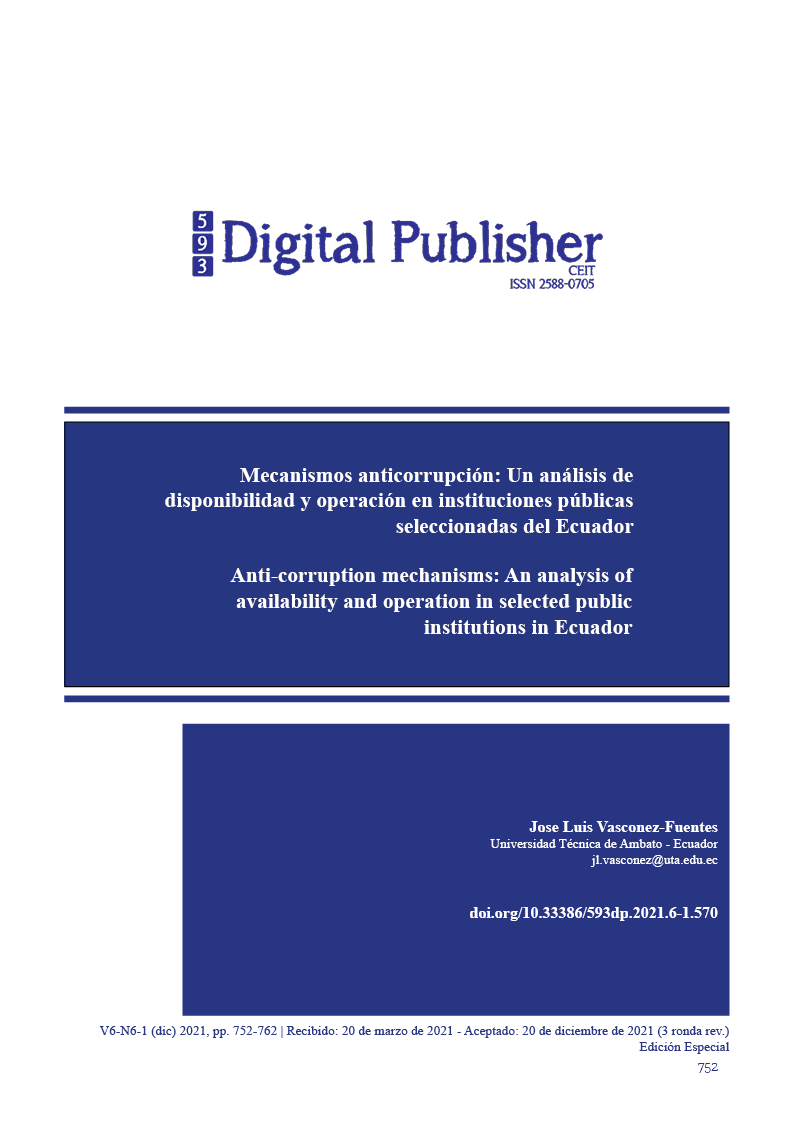Anti-corruption mechanisms: An analysis of availability and operation in selected public institutions in Ecuador
Main Article Content
Abstract
The fight against corruption has been one of the main priorities at the national, regional and international levels. However, drawbacks remain in the process of improving public service delivery. The objective of the study was to evaluate the suitability of available anti-corruption mechanisms to combat corruption in selected public institutions in Ecuador. The methodological design that the study adopted was phenomenological-hermeneutical, since the researcher associates and interprets the meanings of his experiences with corruption. The study population comprised all the heads of the institutions that were considered in the multisectoral approach to the fight and prevention of corruption. It was concluded that international, regional and national mechanisms have been vulnerable and flexible to combat corruption. This is because there is a problem in the sentencing regime for corruption offenses where courts can impose unreasonable low sentences that are not adequate to deter offenders who promote corrupt practices.
Downloads
Article Details

This work is licensed under a Creative Commons Attribution-NonCommercial-ShareAlike 4.0 International License.
1. Derechos de autor
Las obras que se publican en 593 Digital Publisher CEIT están sujetas a los siguientes términos:
1.1. 593 Digital Publisher CEIT, conserva los derechos patrimoniales (copyright) de las obras publicadas, favorece y permite la reutilización de las mismas bajo la licencia Licencia Creative Commons 4.0 de Reconocimiento-NoComercial-CompartirIgual 4.0, por lo cual se pueden copiar, usar, difundir, transmitir y exponer públicamente, siempre que:
1.1.a. Se cite la autoría y fuente original de su publicación (revista, editorial, URL).
1.1.b. No se usen para fines comerciales u onerosos.
1.1.c. Se mencione la existencia y especificaciones de esta licencia de uso.
References
Camacho, J. (2020). Participación ciudadana para el combate a la corrupción. Un análisis del Comité de Participación Ciudadana del Sistema Nacional Anticorrupción. Revista Buen Gobierno, 21(28), 1–15. https://doi.org/10.35247/buengob_28_06
Chumachenko, D., Yemelyanov, V., Zhovnirchyk, Y., Bandura, I., & Karpeko, N. (2021). Social models of anti-corruption and corrupt practices in the global and European dimension Modelos. Apuntes Universitarios, 11(3), 183–196.
Maldonado, V. (2021). Transparencia en entidades públicas y su relación con la implementación de sistemas de gestión y normatividad anticorrupción. SIGNOS - Investigación En Sistemas de Gestión, 13(1), 1–24. https://doi.org/10.15332/6346
Mellado, D., & Moya, E. (2021). Factores que inciden la implementación de medidas anticorrupción en proyectos concesionados en Chile. Un Estudio de caso Daniela. Revista Estudios de Políticas Públicas, 7(1), 29. https://doi.org/10.5354/0719-6296.2021.60308
Olusola, J., & Oluwatosin, M. (2020). Comparative appraisal of anti- corruption laws: lessons nigeria can learn from norway, united kingdom and united states’ anti-corruption strategies. International Journal of Management (IJM), 11(7), 338–347. https://doi.org/10.34218/IJM.11.7.2020.032
Orbegoso, C. (2021). Anticorrupción, modernización de estado y gobierno transparente.
Pawlak, M. (2020). Optimizing role-playing learning strategies and reinforcing self-control toward anti-corruption knowledge. Journal of Education, Teaching, and Learning, 5(1), 159–162.
Philip, E., & Chiamaka, J. (2020). Anti-corruption campaign in nigeria: analyzing the dimension of the catholic church’s social teachings. OWIJOPPA, 4(1), 14–25.
Pinchuk, V., & Shevchenko, O. (2021). Implementation of preventive mechanisms to prevent corruption in state authorities of ukraine. Laplage Em Revista, 7(Extra-E), 65–74. https://doi.org/10.24115/s2446-622020217extra-e1162p.65-74
Ramazanovich, N., & Shavkatovich, S. (2021). Political and Legal Mechanisms of the Fight against Corruption in Uzbekistan and High Effective Measures against It. International Journal of Development and Public Policy, 3991(7), 4–7.
Taboada, A. (2020). Políticas públicas anticorrupción: un enfoque basado en la evidencia anti-corruption. Univ. Estud. Bogotá (Colombia), 12(22), 159–176.


